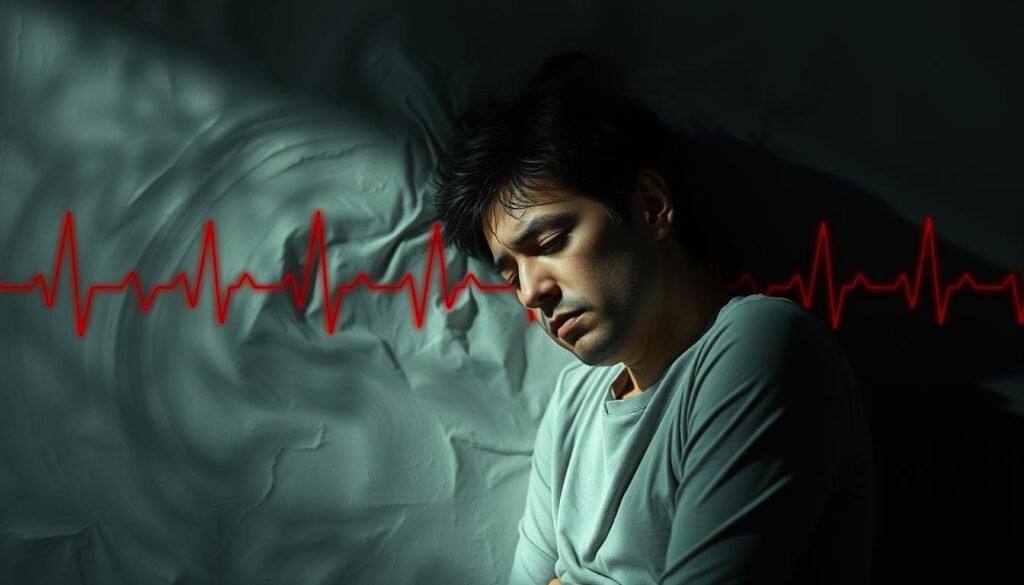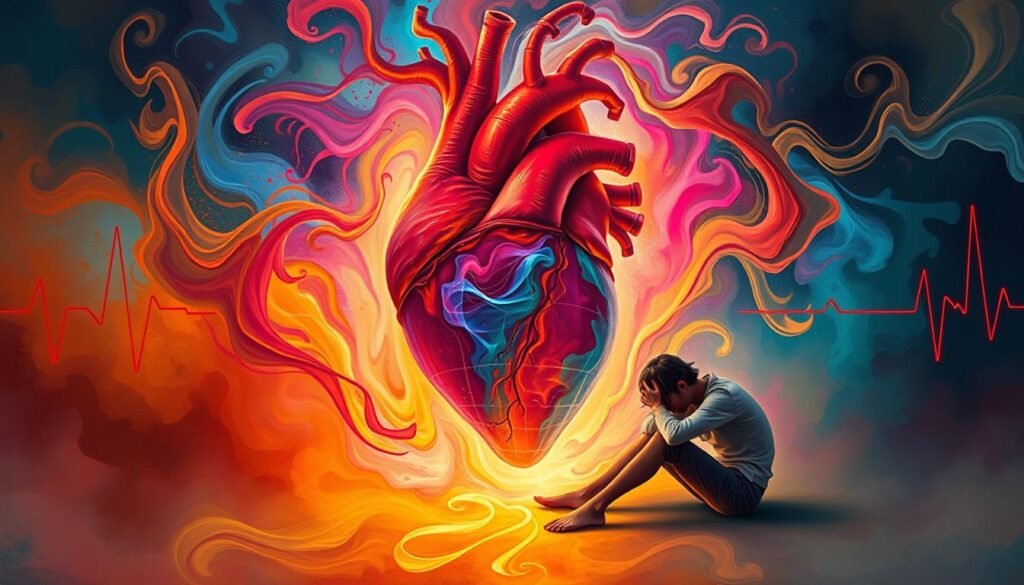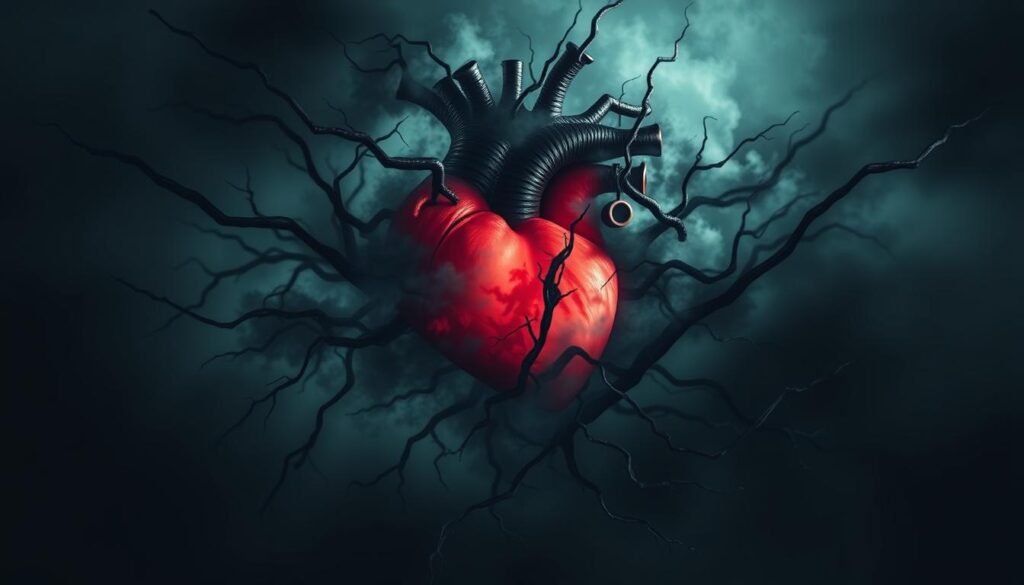About 1 in 3 people with atrial fibrillation don’t know they have it. This fact highlights the ignored link between two symptoms: extreme fatigue and heart palpitations. These symptoms can really lower someone’s quality of life. Emotional stress, anxiety, and health problems often merge, making people search for answers for their symptoms.
Atrial fibrillation can show up as dizziness, fatigue, and scary heart palpitations. Knowing and understanding these signs is key to managing them well. By exploring the root causes of these issues, we can find ways to improve our health and energy.
Key Takeaways
- Extreme fatigue and heart palpitations can significantly impact daily life.
- Conditions like atrial fibrillation may cause irregular heartbeats and fatigue.
- Emotional factors such as stress and anxiety contribute to these symptoms.
- It’s essential to recognize serious symptoms related to heart health.
- Lifestyle changes can be effective in managing extreme fatigue and palpitations.
Understanding Extreme Fatigue
Extreme fatigue goes beyond normal tiredness and creates major daily life challenges. It is crucial to know its key features, symptoms, and the common wrong beliefs for effective handling.
Defining Extreme Fatigue
Extreme fatigue shows as an overwhelming tired feeling that doesn’t match one’s recent activities. It can block everyday activities and comes from many physical and mental reasons. People with extreme fatigue often can’t feel rested, hurting their life quality.
Symptoms of Extreme Fatigue
Symptoms of fatigue can show up in many ways. Here are some common signs:
- Persistent tiredness
- Weakness and lack of motivation
- Difficulties with concentration
- Sleep disturbances
- Physical discomfort or pain
These symptoms might look like just being very tired. Yet, sometimes, they point to serious health problems needing a doctor’s care.
Common Misconceptions about Fatigue
Many misconceptions about fatigue exist, which can delay correct diagnosis and treatment. People often wrongly think that just more sleep can fix fatigue, not seeing it could be a sign of illnesses like anemia or thyroid issues. Learning more about extreme fatigue helps with early help and support.
| Fatigue Symptom | Potential Causes |
|---|---|
| Persistent tiredness | Lack of sleep, chronic illness |
| Weakness | Anemia, muscle diseases |
| Difficulty concentrating | Depression, anxiety, sleep disorders |
| Physical discomfort | Fibromyalgia, chronic fatigue syndrome |
Understanding the depth of extreme fatigue is key. People with these symptoms might have conditions like Postural Orthostatic Tachycardia Syndrome (POTS), which affects millions in the U.S. For more details, check out this resource. With better knowledge and support, those dealing with extreme fatigue can seek out right treatments for them.
What Are Heart Palpitations?
Heart palpitations make your heartbeat feel fast, fluttering, or strong. You might feel your heart racing, skipping, or thumping hard in your chest, neck, or throat. Most of the time, they’re not caused by serious health problems.
Definition and Symptoms
Many things can trigger heart palpitations, including stress, worry, what you eat, and your daily activities. The common signs are:
- A feeling of a racing heart
- Skipped beats
- Pounding sensation in the chest or neck
Anxiety is a big reason people get heart palpitations that aren’t due to heart issues. It touches 1 in 5 people in the U.S. at some period in their lives. Stressful moments, like speaking in public or interviews, often cause these feelings. They usually begin suddenly and go away fast. For more details, click on this link.
When to Be Concerned about Heart Palpitations
If you have heart palpitations, it’s not always a big deal. But, there are times you should see a doctor. You need to get help if:
- Palpitations last a long time and hurt your chest
- You have trouble breathing when they happen
- You get really dizzy, confused, or faint
If palpitations make you very tired or lower your quality of life, get it checked out. Knowing when to seek medical help is key to taking good care of your heart and health.
Common Causes of Extreme Fatigue and Heart Palpitations
There are many reasons why extreme fatigue and heart palpitations happen. They come in different forms. Knowing these causes could help you take care of your health better.
Emotional Factors: Stress and Anxiety
How you feel inside is key to your health. Too much stress and worry can lead to serious tiredness. These feelings can show up as physical signs like heart palpitations. Anxiety can make your heart beat faster and cause discomfort. This can make you feel more tired when doing everyday tasks.
Being stressed for a long time can make you feel even more tired. This creates a hard cycle to break.
Physical Causes: Medical Conditions and Lifestyle
Many health issues can cause tiredness and a racing heart. Common ones include anemia, which means you have too few red blood cells; not drinking enough water, which makes blood flow badly; and thyroid issues, which mess up how fast your body works. It’s also important to look at lifestyle choices. Eating poorly, not exercising, and using things like caffeine or smoking can start these symptoms. Together, these factors play a big role in why you feel very tired.
| Cause | Description | Impact on Health |
|---|---|---|
| Stress | High emotional stress can lead to anxiety and physical exhaustion. | Increases heart rate, causing palpitations and fatigue. |
| Anemia | A deficiency in red blood cells leading to insufficient oxygen. | Causes tiredness and can result in palpitations. |
| Thyroid Dysfunction | Hormonal imbalances affecting metabolic functions. | Can lead to fatigue and irregular heart rhythms. |
| Poor Diet | Lack of essential nutrients can lead to decreased energy. | Contributes to feelings of fatigue and palpitations. |
| Substance Use | Caffeine and nicotine can heighten stress and anxiety. | May improve alertness but ultimately increases heart rate. |
Conditions Linked to Extreme Fatigue
Many medical conditions can make you feel extremely tired. This fatigue makes daily tasks hard. Knowing these conditions helps manage symptoms better.
Medical Conditions That Cause Fatigue
Many illnesses linked to fatigue have been identified. These greatly affect people. Among them are:
- Chronic Fatigue Syndrome: This is a long-lasting fatigue, not caused by other illnesses. It goes on for six months or more.
- Fibromyalgia: It causes pain all over the body and makes you very tired. Sleep problems often occur too.
- Depression: A mental condition with ongoing sadness and lack of interest. It also leads to tiredness.
- Sleep Disorders: Issues like sleep apnea ruin good sleep. This results in feeling too tired during the day.
Postural Orthostatic Tachycardia Syndrome (POTS)
Postural Orthostatic Tachycardia Syndrome (POTS) is important but sometimes missed. It affects how your blood circulates. Standing up causes fatigue and dizziness in sufferers. It’s often found in younger women. Symptoms include:
- Rapid heartbeat with position changes
- Dizziness and feeling faint
- Severe fatigue impacting daily life
POTS shows how complex fatigue-related conditions can be. It greatly affects how one functions. Knowing about POTS and similar conditions is key to getting the right help.

Connections Between Fatigue and Heart Palpitations
Fatigue and heart palpitations often merge, making life hard for many. These palpitations can mess with your energy, making you feel tired and weak. It’s important to understand how these two are related, especially for those dealing with tachycardia.
How Heart Palpitations Affect Energy Levels
Heart palpitations can make your heartbeat feel off, leading to anxiety or tiredness. This can zap your energy, making daily tasks hard. The unpredictability of these palpitations can increase unease, making fatigue and palpitations worse.
Understanding the Link: Tachycardia and Fatigue
Tachycardia’s impact is also key in this connection. A too-fast heartbeat can make you feel really tired. People with conditions like POTS might feel incredibly wiped out, even more than with usual sickness. Suddenly feeling tired or tiredness that lasts a long time can happen with POTS. Knowing how tachycardia affects energy sheds light on the fatigue and palpitations link.
| Condition | Symptoms | Potential Triggers |
|---|---|---|
| POTS | Extreme fatigue, dizziness, nausea, heart palpitations | Dehydration, prolonged sitting/standing |
| Heart Palpitations | Rapid heart rate, fluttering sensation, skipped beats | Caffeine, anxiety, stress |
| Tachycardia | Increased heart rate, fatigue | Strenuous exercise, illness, emotional stress |
Symptoms Associated with Heart Palpitations
Heart palpitations come with various symptoms of heart palpitations. It’s important to know these signs. While most cases are not serious, knowing when they are can save lives. Those with palpitations should look for other signs that might point to a bigger problem.
Additional Symptoms to Watch For
People might feel their heart racing or fluttering. They can also have:
- Breathlessness
- Dizziness or lightheadedness
- Chest pain or discomfort
- Excessive sweating
- Fatigue or weakness
Recognizing Serious Symptoms
Knowing when symptoms are serious is key. If any of these happen, see a doctor right away:
- Prolonged chest discomfort or tightness
- Lightheadedness that leads to fainting
- Trouble breathing or shortness of breath
- Confusion or sudden weakness
- A resting pulse rate exceeding 100 beats per minute
Keeping an eye on these symptoms is important. It helps spot additional heart issues early. Acting early can stop more serious problems with heart palpitations.

| Symptom | Severity Level | Action Required |
|---|---|---|
| Breathlessness | Moderate to Severe | Consult a doctor if persistent |
| Dizziness | Moderate | Monitor, seek help if frequent |
| Chest Pain | Severe | Immediate medical attention |
| Excessive Sweating | Moderate | Seek evaluation if unrelated to activity |
| Rapid Heartbeat | Moderate | Monitor, seek medical advice if ongoing |
Treatment Options for Extreme Fatigue
Searching for the right treatment for extreme fatigue involves many choices. These choices include changing your lifestyle and trying medical options. Finding what works best can greatly boost your energy and overall health. It’s very important to figure out why you’re tired in the first place.
Lifestyle Changes
Making some changes in your life can really help with fatigue. Here are a few things that work well:
- Balanced Diet: Eating well gives you the energy to fight off tiredness.
- Regular Exercise: Staying active increases your stamina and helps you feel less tired.
- Quality Sleep: Good sleep habits make your sleep more refreshing.
- Stress Management: Lowering stress through mindfulness or yoga improves your overall health.
Medical Interventions
If extreme fatigue is severe and linked to health issues, getting medical help is important. Potential treatments include:
- Medications: Doctors may give you medicine for symptoms like pain or low blood pressure.
- Therapies: Cognitive behavioral therapy or physical therapy might be suggested to help you manage.
- Specialized Care: Seeing a specialist for issues such as pain or sleep problems could be recommended.
| Treatment Method | Description | Benefits |
|---|---|---|
| Lifestyle Changes | Adjustments in diet, exercise, and sleep habits. | Improved energy, better mood, enhanced health. |
| Medications | Medicines prescribed based on specific symptoms. | Target relief for pain and other discomforts. |
| Therapies | Therapeutic interventions focusing on mental and physical health. | Increased coping mechanisms and overall functioning. |
Looking into these treatment options can really help manage extreme fatigue. Getting advice from health experts is key to finding what works for you.
Understanding Arrhythmias and Heart Palpitations
Arrhythmias are key to heart health, especially concerning heart palpitations. They come in various forms and bring different symptoms. Knowing about these can help keep your heart healthy.
Types of Arrhythmias
Individuals might face several types of heart arrhythmias, each with unique features:
- Tachycardia: This happens when the heart beats over 100 times a minute. It’s serious and can cause more heart problems if ignored.
- Bradycardia: This is when the heart rate is under 60 beats per minute. It’s often a sign of health issues, mainly in older folks.
- Atrial Fibrillation (AFib): A common type, AFib makes the heart beat in a fast, unordered way. This raises the stroke risk fivefold.
- Ventricular Fibrillation: Extremely dangerous, this can kill within minutes if the heart’s rhythm isn’t fixed right away.
- Sick Sinus Syndrome: This typically affects the elderly, causing a dangerously slow heartbeat that needs careful monitoring.
Potential Complications from Arrhythmias
Arrhythmias can cause severe health issues:
- Fainting due to quick heart rate changes.
- Cardiac arrest, mostly from ventricular fibrillation.
- A higher stroke chance in atrial fibrillation patients.
- Long-standing heart failure from not treating arrhythmias.
Arrhythmias’ symptoms include chest pains, breathing trouble, and feeling dizzy. Spotting these early is crucial for getting help fast. Some arrhythmias pose serious risks to our health.
Role of Diet and Exercise in Managing Symptoms
Adopting a diet for heart health is key in easing symptoms like fatigue and palpitations. The right nutrients boost energy and well-being. Eating fruits, vegetables, whole grains, lean proteins, and healthy fats improves heart function. This helps manage fatigue better.
Dietary Adjustments for Heart Health
Adding certain foods to your diet brings many benefits. Omega-3 fatty acids, found in fish, walnuts, and flaxseeds, fight inflammation and aid heart function. Keeping sodium low, under 2,300 mg a day, is ideal for heart recovery. Drinking at least eight glasses of water daily is crucial for health.
The Importance of Exercise
Regular exercise is vital for combating fatigue and heart issues. It helps lower blood pressure, reduce inflammation, and keep weight healthy. Mixing aerobic exercises with resistance training is best for the heart. Try to get at least 30 minutes of moderate exercise five times a week and weightlift twice.
When exercising, aim for a specific heart rate to monitor your effort. Always listen to your body and adjust gradually to avoid fatigue and soreness. For details on how nutrition influences energy, click here.
Anxiety’s Impact on Heart Health and Fatigue
Anxiety does more than affect your mood; it can hurt your heart and make you feel tired from worry. People with heart problems, like coronary artery disease or heart failure, often feel more anxious. Knowing how anxiety impacts the heart helps people find good ways to handle it.
How Anxiety Alters Heart Rate
When you’re anxious, your heart beats faster. This can make you more aware of your heart and feel more tired. Research shows that after a heart attack, 20-30% of patients may feel anxious because of their heart health. Also, 25% of those waiting for heart surgery report high anxiety, showing a strong connection between anxiety and heart issues.
Managing Anxiety to Help Reduce Symptoms
Handling anxiety well is key for those with heart problems. Techniques like cognitive behavioral therapy and relaxation exercises can help lower anxiety. This not only makes you feel better emotionally. It can also lessen tiredness from anxiety and heart flutters. This article highlights the value of treating anxiety for overall health improvement.

Conclusion
Knowing about extreme fatigue and heart palpitations is key if you’re feeling these symptoms. A big study found a link between being very tired and having heart troubles. People who were very exhausted were 20% more likely to get a heart condition called atrial fibrillation.
This heart issue could impact 10 million Americans soon. Spotting symptoms early can help manage your health better. This means it’s important to pay attention to how you’re feeling.
To handle health well, figure out why you’re tired and your heart beats weirdly. Changing how you live, like drinking less caffeine and trying relaxation methods, can make a difference. Sometimes, seeing a doctor is the best step if things don’t improve or if you notice other concerning signs.
Understanding the link between feeling worn out and heart palpitations puts you in control. Being aware and getting the right help can make life better. It changes how you deal with these health issues.